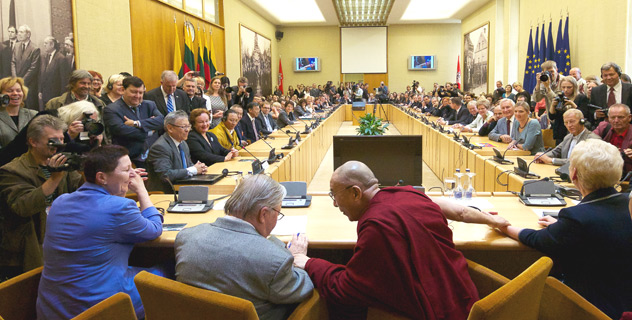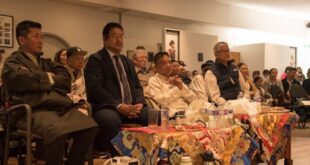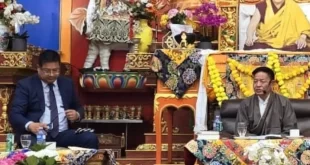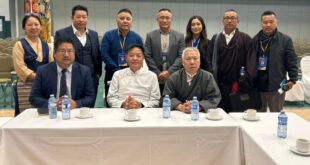September 12th 2013
Vilnius, Lithuania, 12 September 2013 – People in Vilnius could be heard expressing surprise about the unusually good weather for the time of year, attributing it to His Holiness the Dalai Lama’s presence in the city. He laughed off the suggestion, pointing out that if he had any ability to influence the weather he’d be sure to use it when he wanted to fly.
This morning he drove to the nearby Academy of Arts, where his first public engagement was a meeting with the press. He began by outlining his two lifelong commitments: encouraging the adoption of human values as a basic source of happiness and promoting inter-religious harmony. He also highlighted the media’s responsibility to increase awareness of such issues among the public.
Responding to a question about the self-immolations that have been taking place in Tibet, he clarified that the demarcation between violent and non-violent action lies not in the nature of the physical or verbal activity itself, but in the motivation for it.
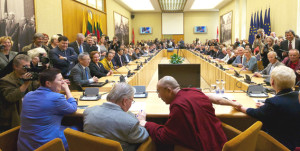
Another short drive took him to the Lithuanian Parliament building where he was met at the front step by Irena Degutienne, Deputy Speaker of the Parliament who escorted him into a preliminary meeting. Encountering his old friend, Vytautas Landsbergis, the first leader of independent Lithuania, he embraced him warmly. Speaking about the situation in Tibet, he said:
“The more people there are suppressed, the stronger is their spirit of defiance. In fact, the younger people seem to be even more determined than their elders.”
He spoke of how close he feels to the people of Lithuania and recalled witnessing how they had kept up their spirits when he visited the country in 1991 shortly after independence had been restored. His visits to Lithuania have reaffirmed his sense of what determination and the power of truth can achieve. He said that what he also wanted to share with his old friends was that the ultimate source of a happy life is within us. Moreover, since all major religious traditions have the potential to give their followers inner peace, it is important that there be harmony among them.
Regarding Tibet, he explained that having failed to evoke any concrete response to the issue at the UN, in 1974 they concluded that sooner or later they would have to discuss it directly with the Chinese authorities. They decided that at such a time, their realistic goal would be meaningful autonomy. Despite changes that have taken place in China since then, the Tibetan stand has been consistent.
“Today, the new Chinese leadership seems to be taking a new line with its admirable efforts to tackle corruption. Their more holistic and realistic approach may be a sign of a change in policy under which the situation may improve. Meanwhile, to protect their own vested interests, Chinese hardliners continue to accuse me of being a ‘splittist’, which means my Lithuanian friends are supporting a splittist too. This is wrong.
“Many intellectuals, writers and campaigners, including Liu Xiaobo have expressed support for our cause. So, I think it may yet be possible to find a mutually acceptable solution.”
His Holiness commended the display of the Tibetan flag, recounting an occasion in 1954 when Chairman Mao had asked if Tibetans had a national flag. Learning that they had, he said they should fly it alongside the Red Flag, Today, flying the Tibetan flag in Tibet is considered a crime and China criticizes Tibet Supporters elsewhere for doing so, but His Holiness is confident that Chairman Mao gave his permission.
A member of the audience mentioned that the EU Commissioner for Human Rights is to visit China and has been promised the opportunity to visit Tibet. His Holiness suggested that since environmental issues have such a bearing on so many people, with more than 1 billion people dependent on rivers that rise in Tibet, the delegation should examine how much damage has already been done. He also recommended that it go, with a Tibetan interpreter, to the places where self-immolations have taken place and investigate their causes.
With respect to preserving Tibetan Buddhism, he expressed appreciation for temples and colossal statues, but pointed out that even if the statues survive for 1000 years, they will never speak. More effective would be the establishment of libraries for study.
His Holiness agreed with another questioner who pointed out that there are 105 democratic countries in the world at present and that democracy and Buddhism have complementary standards. He repeated advice he has given in Taiwan:
“Think more about improving the economy in the longer term, than in terms of winning the next election. People elected you; act as their representatives. I admire democracy, but occasionally the system needs to be shaken up.”
The Mayor of Vilnius, Arturas Zuokas, invited His Holiness to lunch at his residence with its panoramic view over the city. They were joined by former President Valdas Adamkus and other guests. After the meal, the Mayor escorted His Holiness to Vilnius City Hall to address an assembly of invited guests.
Later, while addressing a largely younger audience in Tibet Square, he said:
“People everywhere greet me with a smile, which makes me happy. However, I do occasionally lose my temper, but I try to reduce it and distance myself from it. Anger is disruptive and destructive; therefore, we need to distance ourselves from it when it arises.”
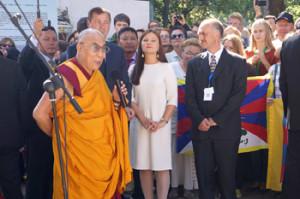
He then joined monks from Sera Jey Monastery in briefly consecrating a sand mandala they had constructed.
Back at the Academy of Arts he had a few words for a group of Russian Buddhists, telling them that they should aspire to be twenty-first century Buddhists. He said one aspect of Buddhism involves ritual and superstition and will not survive. Another aspect involves investigation and examination, which is why explanations of emptiness of inherent existence and infinite altruism are attracting wider interest. He said that although construction of temples is important, it would be much more useful to translate books.
“In a small Buddhist group you can occasionally hold a puja, but it would be much more beneficial to hold discussion groups about what the Buddhadharma means.”
When someone said he did not know how to find the time to practise, His Holiness said:
“You must have a weekend and during the week, when you get home from work you can have a simple dinner and go to bed early so you can get up early in the morning. You should have enough time to find an hour to practise. Meditation is always better in the morning; keep your recitations for the afternoon or evening. The more experience you get, the more you’ll be able to practise 24 hours a day.”
